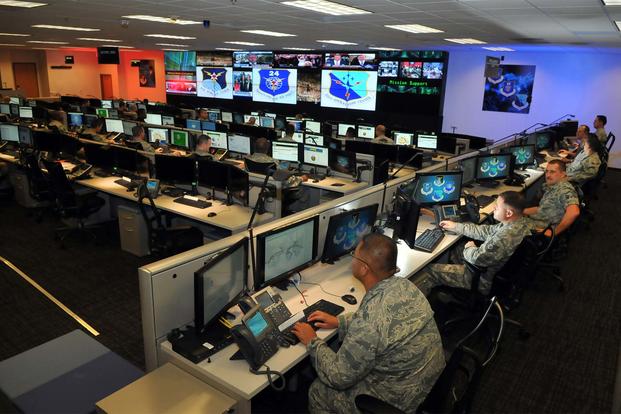President Donald Trump announced Friday he plans to make U.S. Cyber Command a unified combatant command on par with U.S. Central Command and other similar independent units in the military that report directly to the secretary of defense.
The move would end the so-called "dual hat" arrangement in which Cyber Command is part of the National Security Agency under Navy Adm. Mike Rogers.
"The elevation of United States Cyber Command demonstrates our increased resolve against cyberspace threats and will help reassure our allies and partners and deter our adversaries," Trump said in a statement.
The intention to make Cyber Command an independent unit in the military left Rogers' status unclear.
At a Pentagon briefing, Kenneth P. Rapuano, the assistant secretary of defense for homeland defense and global security, said Defense Secretary Jim Mattis will recommend a nominee to Trump to head the new Cyber Command.
Until a nominee for the new post is confirmed by the Senate, Rogers will continue in the dual role as head of Cyber Command and the NSA, Rapuano said.
He did not rule out that Rogers could be the nominee to head Cyber Command.
Rapuano stressed that the new arrangement does not signal dissatisfaction with Rogers' performance. He said Mattis retains "total confidence" in the admiral.
In a statement, the Defense Department said making Cyber Command one of the 10 unified combatant commands came on Mattis' recommendation.
Cyber Command had been what was called a "sub-unified command" within U.S. Strategic Command, while also being part of the National Security Agency, the nation's top agency in cryptology and signals intelligence.
The elevated status for Cyber Command reflects "the growing centrality of cyberspace to U.S. national security," the DoD statement said.
"Raising the organizational status of U.S. Cyber Command is intended to demonstrate visibly DoD's long-term commitment to cyberspace as a warfighting domain. It also signals the department's resolve to embrace the changing nature of warfare, thus helping to reassure partners and deter adversaries," DoD said.
In a memo to Mattis distributed by the White House, Trump said he wants the new Cyber Command to take over "the cyberspace-related responsibilities previously assigned to the commander, U.S. Strategic Command."
Trump also directed Mattis and National Intelligence Director Dan Coats to present him with plans and recommendations on "the future command relationship between the U.S. Cyber Command and the National Security Agency."
In its recent budget for fiscal 2018, the Trump administration requested $647 million for Cyber Command, a 16 percent increase from the previous year.
-- Richard Sisk can be reached at Richard.Sisk@Military.com.






























